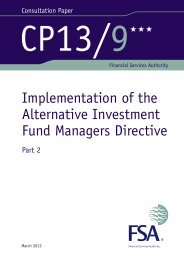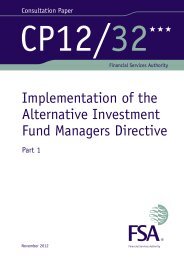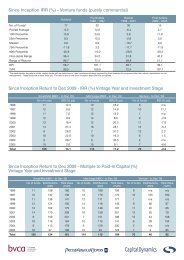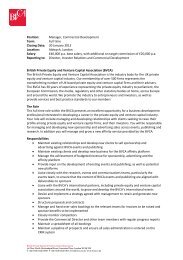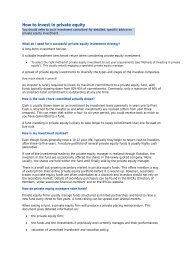A Guide to Private Equity - BVCA admin
A Guide to Private Equity - BVCA admin
A Guide to Private Equity - BVCA admin
You also want an ePaper? Increase the reach of your titles
YUMPU automatically turns print PDFs into web optimized ePapers that Google loves.
As an example consider an entrepreneur who owns 100% of a company and is seeking an initial<br />
investment of £5 million from a venture capital firm. The venture capitalist reviews the proposition and<br />
offers <strong>to</strong> invest £5 million in return for a 40% stake in the entrepreneur’s company. Based on what the<br />
venture capitalist is prepared <strong>to</strong> invest in the company a 100% shareholding must be worth £12.5 million<br />
post investment. This is the post-money valuation.<br />
The remaining 60% of the shares, held by the entrepreneur, are therefore worth £7.5 million. But before<br />
the investment by the venture capitalist the entrepreneur held 100% of the shares in the company. The<br />
venture capitalist has therefore valued the business before he makes his investment at £7.5 million.<br />
This is the pre-money valuation.<br />
If the venture capitalist is concerned that the post-money valuation is <strong>to</strong>o high, he will either put less<br />
money in<strong>to</strong> the venture for the same equity stake or indeed increase his equity stake.<br />
Other valuation methods<br />
<strong>Private</strong> equity firms also use other ways of valuing businesses, such as those based on existing net<br />
assets or their realisable value.<br />
Personal financial commitment<br />
You and your team must have already invested, or be prepared <strong>to</strong> invest, some of your own capital in your<br />
company <strong>to</strong> demonstrate a personal financial commitment <strong>to</strong> the venture. After all, why should a private equity<br />
firm risk its money, and its inves<strong>to</strong>rs’, if you are not prepared <strong>to</strong> risk your own! The proportion of money you<br />
and your team should invest depends on what is seen <strong>to</strong> be “material” <strong>to</strong> you, which is very subjective. This<br />
could mean re-mortgaging your house, for example, or foregoing the equivalent of one year’s salary.<br />
Types of financing structure<br />
If you use advisers experienced in the private equity field, they will help you <strong>to</strong> negotiate the terms of the<br />
equity deal. You must be prepared <strong>to</strong> give up a realistic portion of the equity in your business if you want<br />
<strong>to</strong> secure the financing. Whatever percentage of the shares you sell, the day-<strong>to</strong>-day operations will remain<br />
the responsibility of you and your management team. The level of a private equity firm’s involvement with<br />
your company depends on the general style of the firm and on what you have agreed with them.<br />
There are various ways in which the deal can be financed and these are open <strong>to</strong> negotiation. The<br />
private equity firm will put forward a proposed structure for consideration by you and your advisers that<br />
will be tailored <strong>to</strong> meet the company’s needs. The private equity firm may also offer <strong>to</strong> provide more<br />
finance than just pure equity capital, such as debt or mezzanine finance. In any case, should additional<br />
capital be required, with private equity on board other forms of finance are often easier <strong>to</strong> raise. The<br />
structure proposed may include a package of some or all of the following elements.<br />
Classes of capital used by private equity firms<br />
The main classes of share and loan capital used <strong>to</strong> finance UK limited liability companies are shown below.<br />
Share capital<br />
The structure of share capital that will be developed involves the establishment of certain rights. The<br />
private equity firm through these rights will try <strong>to</strong> balance the risks they are taking with the rewards they<br />
are seeking. They will also be aiming <strong>to</strong> put <strong>to</strong>gether a package that best suits your company for future<br />
growth. These structures require the assistance of an experienced qualified legal adviser.<br />
Ordinary shares<br />
These are equity shares that are entitled <strong>to</strong> all income and capital after the rights of all other classes of<br />
capital and credi<strong>to</strong>rs have been satisfied. Ordinary shares have votes. In a private equity deal these are<br />
the shares typically held by the management and family shareholders rather than the private equity firm.<br />
The investment process<br />
A <strong>Guide</strong> <strong>to</strong> <strong>Private</strong> <strong>Equity</strong> 29



